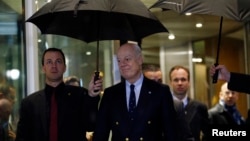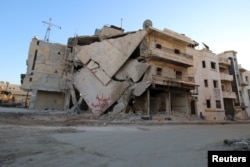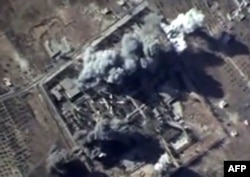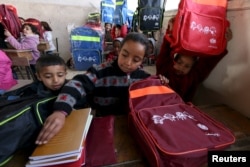The United Nations on Wednesday called off the fractious Syrian peace talks in Geneva until the end of February.
U.N. envoy Staffan de Mistura, who was alternating between discussions with representatives of Syrian President Bashar al-Assad and opposition groups trying to overthrow him, called the delay until February 25 a "temporary pause" and not the demise of what had been the first Syrian peace effort in two years.
"This is not the end," de Mistura said, "and it is not the failure of the talks."
Aleppo takeover
The temporary halt in the talks came as the Syrian army claimed that it has ended the rebel siege of two Shi'ite villages in Aleppo, handing Assad's government a major victory.
Syrian state television said the army and Shi'ite militias known as the Popular Defense Committees had broken the rebels' three-year blockade around Nubul and Zahraa, part of the government's advance in Aleppo province in recent days.
The rebel defeat allows Syrian forces to take control of a supply route from Aleppo to the Turkish border.
The army's success is one of the biggest blows to the insurgents since they captured large parts of Aleppo, Syria's largest city, in the summer of 2012.
The U.S. blamed the pause in peace talks on Russian airstrikes that disrupted humanitarian aid to Syrians.
State Department spokesman John Kirby said Russian airstrikes around Aleppo focused mainly on opposition forces, not Islamic State militants.
"Today we continue to see more Russian airstrikes in and around Aleppo. Strikes not aimed at DAESH," said Kirby, using the acronym for the Arabic name for the Islamic State, "but rather almost exclusively on the opposition. Strikes which again have led to reports of civilian casualties, increased displacement of Syrian citizens and the possible destruction of humanitarian assistance routes."
Elsewhere, Syria's state news agency SANA said rebels had fired several rockets in the southern city of Daraa, killing 10 civilians and wounding 41 in a residential area. Daraa is a contested area with forces loyal to both Assad and armed opposition groups trying to overthrow him.
The new fighting came as the country's main opposition group, the High Negotiations Committee, appealed to international donors for more financial support for the Syrian people affected by the nearly five-year conflict.
The committee, speaking ahead of a donor conference in London on Thursday, said, "Syrians need concrete action from our friends to stop the indiscriminate bombardment" being carried out by Assad's forces with aerial support from Russian fighter jets.
Russian airstrikes
Russian Foreign Minister Sergei Lavrov said Wednesday his country's military will not stop its airstrikes in Syria until "terrorist organizations" there are defeated.
Lavrov specifically mentioned the al-Qaida-linked Jabhat al-Nusra as a target of the strikes, saying he does not see why they should stop.
Russia has come under Western criticism for its air campaign in Syria, saying it focuses on opposition fighters opposed to Assad, instead of Islamic State militants, which Russia repeatedly has denied.
US urges end to airstrikes
U.S. Secretary of State John Kerry called for an end to airstrikes on Tuesday and said a cease-fire in Syria should be implemented soon.
"We are all extraordinarily sympathetic to the limits of propriety and common sense in the opposition sitting at the table while someone continues to bomb them,'' Kerry said in Rome, where he attended a meeting of coalition members fighting the Islamic State group.
But members of the opposition delegation in Geneva said the gesture would make little difference for the peace process. One representative, Ahmad Ramadan, said the only way to save the talks is for the United Nations and the United States to “force an end to the bombardment and the targeting of civilians.”
"The regime’s and Russia’s actions gravely threaten the political process at this early stage,” another opposition member, Farah Atassi, said.
The Syrian government on Tuesday allowed 14 trucks carrying humanitarian aid to travel into a rebel-held area near Damascus as a demonstration of good will. The opposition called it an “empty” gesture as long as government forces continue to step up their offensive.
The Syrian government delegation said it did not open formal negotiations as scheduled Tuesday with U.N. envoy de Mistura, saying the basic framework or agenda of the talks had yet to be established, and the process had not yet moved beyond the preparatory phase.
“We are waiting to find out the procedural issues, who will negotiate. Until now nothing is clear: one or two or three or four delegations? There is no clear answers,” Bashar Jaafari, the chief Syrian government representative told reporters in Geneva.
Troubled talks
At the same time, the main opposition group canceled a meeting it had scheduled with de Mistura Tuesday, saying the escalating assault by Syrian government forces and their Russian allies are reasons not to pursue negotiations.
De Mistura declared the talks officially under way on Monday, after persuading the opposition to join the talks. “As far as we are concerned, their arrival to the Palais des Nations and initiating the discussion with us is the official beginning of the Geneva talks,” the UN envoy said.
The formal start came exactly one week after they were originally scheduled to begin, and now they are delayed again.
But the opposition was threatening to walk out of the talks if the airstrikes did not stop and if the government does not lift the siege it says is preventing humanitarian aid from reaching civilians in rebel-held areas.







